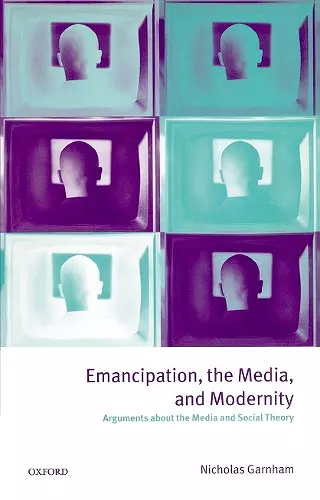Emancipation, the Media, and Modernity
Arguments about the Media and Social Theory
Format:Paperback
Publisher:Oxford University Press
Currently unavailable, and unfortunately no date known when it will be back
This paperback is available in another edition too:
- Hardback£56.00(9780198742258)

This book adopts a polemical stance. It approaches the problems raised by the media by way of a set of arguments with the two dominant paradigms now current for thinking about the media–post-modernism and Information Society theory. It argues that the media are important because they raise a set of questions that have been central to social and political theory since the Enlightenment. In a series of probes into different sets of questions raised by the media, the argument of the book focuses on the problem raised by what Kant called the unsocial sociability of human kind. Under what conditions could autonomous, free individuals live in viable social communities. Or to put it another way what are the related scope for, and limits on, human reason and emancipation. In conducting this argument the book first argues for a necessarily historical perspective. It then goes on to examine the implications for emancipation of seeing the media as cultural industries within the wider systems world of the capitalist market economy; of seeing the media as technologies; of the specialisation of intellectual production and of the separation and increasing social distance between the producers and consumers of symbols. It then goes on to argue, against current ethnographic trends in audience research and against the focus on everyday life, for a reinstatement of interest in the statistical reality of audiences and effects, and for a recognition through a return to the Hegelian roots of commodity fetishism, and the symbolic interactionist creation of identities, that an active audience can be actively involved in its own domination. The argument then turns to the problem of how we evaluate the symbolic forms that the media circulate and whether such evaluation can be anything more than a matter of personal taste. It is argued that evaluation is in practice unavoidable and without some standards that are more than just subjective any criticism of the medias performance is impossible. Via an examination of the debate between the sociology of art and aesthetics it argues for the ethical foundations of aesthetic judgement and for the establishment of agreed standards of aesthetic judgement via the discourse ethic that underlies the argument of the entire book. This foregrounding of the discourse ethic then leads on to a...
Nicholas Garnham's new book is about moral philosophy, social theory and media analysis. Often these subjects are held to be separate. For Garnham, they are inseparable. This is certainly a major strength of this work, his work in general, and it should be emulated. To hold these subjects together in the face of increasing specialization in universities is a difficult task but one that Garnham achieves through his ability to proceed quickly, and with clarity, to what is essential in an argument. He is at home in all three subjects. * John Downey, European Journal of Communication 16 (1) *
This is a very important book. It marks one of those very few occasions when a British academic publishes a book stepping straight through the boundaries of subject areas that mark off your little garden from mine in order to walk with a proper freedom and insouciance across the spaces of the great agora and the public forum. * Nicholas Garnham, THES, 3rd Nov. 2000. *
This is the first book to start from a recognition of the new kind of polity that has developed out of the past 40 years or so in which politics and the public media are mutually embedded and government impossible without the complementary of both. * Nicholas Garnham, THES, 3rd Nov. 2000. *
ISBN: 9780198742241
Dimensions: 216mm x 137mm x 12mm
Weight: 280g
214 pages